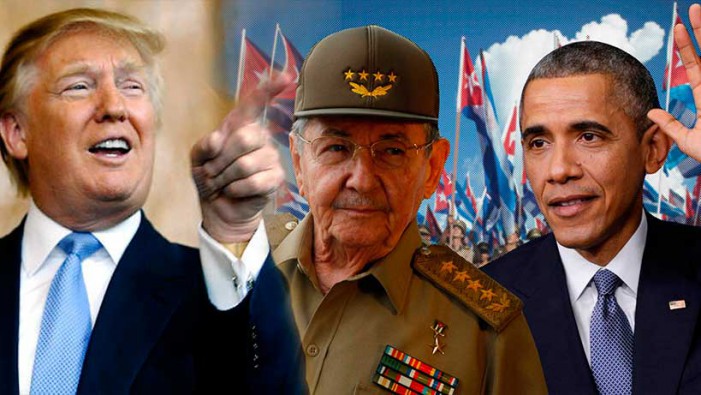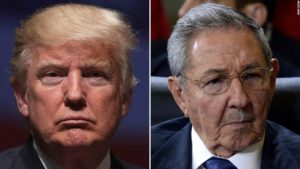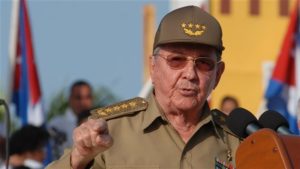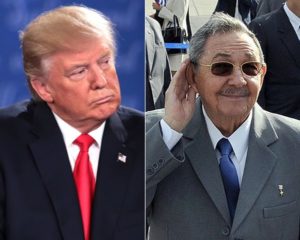On November 25, 2016, a somber Raúl Castro announced on Cuban state television the passing of his brother, Fidel, who ruled Cuba for nearly 50 years. Today, many of Fidel’s followers describe his demise as a “transition to immortality.”
A year after Fidel’s death, some wonder whether Castro is willing to leave power on February 24, 2018—as he promised in 2013—especially in the face of President Donald Trump’s crackdown on U.S. business and travel to the island. The sanctions, which took effect earlier this month, prohibit Americans from doing business with 180 entities linked to the Cuban military, intelligence and security services.
Given the current state of U.S.-Cuba relations, this may be an incentive for Castro to extend his term. “The fatherland is in danger; it is facing very difficult economic circumstances plus the threat of aggression from a historical enemy. Facing difficult circumstances, revolutionary leaders don’t back down,” Domingo Amuchastegui, a former Cuban intelligence analyst who lives in Miami, told The Miami Herald.
Most recently, Cuba and the United States have been in the crosshairs with respect to the alleged sonic attack against U.S. embassy staff in Havana, which led to the removal of 15 Cuban diplomats from Washington in early October. Earlier this month, the U.S.—alongside Israel—voted against a U.N. resolution that underlined the need to lift the embargo against the island. The measure was overwhelmingly approved in the U.N General Assembly by a 191-2 vote.
Trump’s draconian stance on Cuba and North Korea brought both countries together. Cuban Minister of Foreign Affairs Bruno Rodriguez and his North Korean counterpart Ri Yong Ho held an “anti-U.S.” meeting in Havana this week and called on the U.S. to “respect both nations’ sovereignty, independence, self-determination and territorial integrity.”
In addition to the deteriorated relationship with the United States, Cuba has recently faced other economic challenges caused by Hurricane Irma in September and a waning aid from Venezuela.
But despite Cuba’s woes, others believe that the Caribbean nation without the Castros in power is possible. Castro’s daughter, Mariela, said earlier this year that she “would never want to be a contender for the presidency,” Reuters reported.
For this reason, Castro would grant power to Miguel Díaz-Canel, first vice president of the Council of the State. Diaz-Canel, 56, represents a break from the “revolutionary old guard,” The Miami Herald said, since he wasn’t even born when the Cuban Revolution rallied against the right-wing government of Fulgencio Batista in 1959.
Another reason for Castro to step down is his advanced age and the health complications that could come with it, something that occurred to his brother when his health condition began to worsen in 2006. Raul, 86, said during the 2016 party congress that age 60 is the limit to enter the party’s core committee while 70 is the maximum age to hold government and party positions. “Somebody who is 65 or 70 is useful for important activities, but not the activities of an important leader,” Business Insider cited him.
Even though Castro would not be a visible leader starting next February, his clout may still endure. Castro has worked to strengthen institutions “to guarantee the regime’s continuity,” American University professor William LeoGrande told the Herald. “Besides, Castro has said nothing about stepping down as first secretary of the Communist Party of Cuba,” LeoGrande said, adding that Castro is likely to continue to wield influence in policy decisionmaking.
(OPINIÓN) DEJARÁ RAÚL CASTRO EL PODER DE CUBA EN MEDIO DE LAS POLITICAS DE TRUMP CONTRA SU RÉGIMEN?.
El 25 de noviembre de 2016, un sombrío Raúl Castro anunció en la televisión estatal cubana el fallecimiento de su hermano, Fidel, que gobernó Cuba durante casi 50 años. Hoy, muchos de los seguidores de Fidel describen su desaparición como una “transición a la inmortalidad”.
Un año después de la muerte de Fidel, algunos se preguntan si Castro está dispuesto a dejar el poder el 24 de febrero de 2018, como lo prometió en 2013, especialmente frente a la ofensiva del presidente Donald Trump en los negocios de Estados Unidos y viajar a la isla. Las sanciones, que entraron en vigencia a principios de este mes, prohíben a los estadounidenses hacer negocios con 180 entidades vinculadas a los servicios militares, de inteligencia y de seguridad cubanos.
Dado el estado actual de las relaciones entre los Estados Unidos y Cuba, esto puede ser un incentivo para que Castro extienda su mandato. “La patria está en peligro; se enfrenta a circunstancias económicas muy difíciles más la amenaza de agresión de un enemigo histórico. Frente a circunstancias difíciles, los líderes revolucionarios no retroceden “, dijo Domingo Amuchastegui, un ex analista de inteligencia cubano que vive en Miami, a The Miami Herald.
Más recientemente, Cuba y Estados Unidos han estado en la mira con respecto al presunto ataque sónico contra el personal de la embajada de los EE. UU. En La Habana, que llevó a la remoción de 15 diplomáticos cubanos de Washington a principios de octubre. A principios de este mes, EE. UU., Junto con Israel, votó en contra de una resolución de la ONU que subrayaba la necesidad de levantar el embargo contra la isla. La medida fue aprobada abrumadoramente en la Asamblea General de los Estados Unidos por una votación de 191-2.
La postura draconiana de Trump sobre Cuba y Corea del Norte unió a ambos países. El ministro cubano de Asuntos Exteriores, Bruno Rodríguez, y su homólogo norcoreano, Ri Yong Ho, sostuvieron una reunión “antisubvenunidense” en La Habana esta semana y exhortaron a los Estados Unidos a “respetar la soberanía, independencia, autodeterminación e integridad territorial de ambos países”.
Además de la relación deteriorada con los Estados Unidos, Cuba se ha enfrentado recientemente a otros desafíos económicos causados por el huracán Irma en septiembre y una ayuda menguante de Venezuela.
Pero a pesar de los problemas de Cuba, otros creen que la nación caribeña sin los Castro en el poder es posible. La hija de Castro, Mariela, dijo a principios de este año que “nunca querría ser candidata a la presidencia”, informó Reuters.
Por esta razón, Castro le otorgaría el poder a Miguel Díaz-Canel, primer vicepresidente del Consejo de Estado. Díaz-Canel, de 56 años, representa un descanso de la “vieja guardia revolucionaria”, dijo The Miami Herald, ya que él ni siquiera había nacido cuando la Revolución Cubana se unió contra el gobierno derechista de Fulgencio Batista en 1959.
Otra razón por la que Castro debe renunciar es su avanzada edad y las complicaciones de salud que podrían surgir, algo que le ocurrió a su hermano cuando su estado de salud comenzó a empeorar en 2006. Raúl, de 86 años, dijo durante el congreso del partido de 2016 que tenía 60 años es el límite para ingresar al comité central del partido, mientras que 70 es la edad máxima para ocupar puestos gubernamentales y de partido. “Alguien que tiene 65 o 70 años es útil para actividades importantes, pero no para las actividades de un líder importante”, lo citó Business Insider.
Aunque Castro no sería un líder visible a partir del próximo febrero, su peso aún puede perdurar. Castro ha trabajado para fortalecer las instituciones “para garantizar la continuidad del régimen”, dijo al Herald el profesor de la Universidad americana William LeoGrande. “Además, Castro no ha dicho nada sobre renunciar como primer secretario del Partido Comunista de Cuba”, dijo LeoGrande, y agregó que es probable que Castro siga ejerciendo influencia en la toma de decisiones políticas.
Agencies/Newsweek/Robert Valencia/Internet Photos/ Arnoldo Varona/ TheCubanHistory.com
THE CUBAN HISTORY, HOLLYWOOD.



 <> (OPINION) Will Raúl Castro leave Power as Trump Erodes Obama-Era Relations with Cuba? <> (OPINIÓN) Dejará Raúl Castro el Poder de Cuba en medio de las Políticas de Trump contra su Régimen?
<> (OPINION) Will Raúl Castro leave Power as Trump Erodes Obama-Era Relations with Cuba? <> (OPINIÓN) Dejará Raúl Castro el Poder de Cuba en medio de las Políticas de Trump contra su Régimen?






